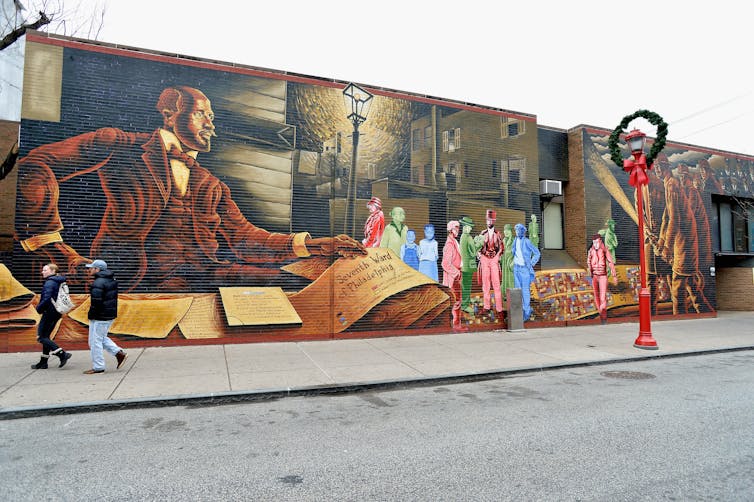Linn Washington Jr., CC BY-NC-ND
A assembly in Philadelphia held at a senior middle on a bitterly chilly Saturday afternoon in late January 2025, drew almost 300 individuals.
They got here for 2 key causes.
One was to voice outrage on the upsurge in insurance policies and proposals nationwide that assault the advances of African Individuals – a lot of which have been secured partially by way of Sixties-era civil rights protests.
The opposite was to start to develop a “Black agenda” to counter these assaults in Philadelphia.
In gathering communally to voice their considerations, attendees continued a legacy of Black-led protest conferences that spans over two centuries within the metropolis.
I’m a professor of journalism at Temple College and a reporter who has coated racial inequities in America and overseas for 50 years. I used to be invited to attend the Philadelphia assembly to speak concerning the historical past of protest conferences within the metropolis.
That’s a historical past of successes and shortfalls that helped form each Philadelphia and the nation.
First mass assembly
Over 200 years in the past, what is taken into account the primary mass protest assembly ever held in the USA by African Individuals occurred in Philadelphia.
That little-known assembly, held in January 1817, drew 3,000 African Individuals to Philadelphia’s historic Mom Bethel AME Church. The attendees got here to denounce efforts by the American Colonization Society to relocate free Black Individuals to a colony in West Africa. That group, with a predominately white membership that included outstanding politicians and preachers, believed free Blacks couldn’t be built-in into white America.
The attendees at Mom Bethel in 1817 noticed relocation as a pressured removing of Black Individuals from the homeland they supported as patriotically as white Individuals. The unanimous opposition that attendees expressed helped change the stance of native Black leaders, similar to Mom Bethel founder Richard Allen, from lukewarm supporters of relocation to opponents.
Successes and shortfalls
The custom of mass conferences to deal with the adversity impacting Philadelphia’s African American group continued from the nineteenth century into the twentieth and now the twenty first century.
The outcomes have been blended.
For instance, after members of the Pennsylvania state legislature proposed inserting a white-males-only voting restriction into the state’s structure in 1838, denying voting rights totally free Black males, Black Philadelphians held mass conferences to demand the supply be deleted.
However these calls for failed. Pennsylvania restricted voting to white males till 1870 when ratification of the fifteenth Modification to the U.S. Structure granted African American males the proper to vote.
Nevertheless, mass conferences throughout the 1860s that had an agenda to desegregate trolleys in Philadelphia have been profitable. A legislation signed in 1867 banned segregated seating on public transit statewide.
Famend scholar and civil rights activist W.E.B. Du Bois credited “public conferences and repeated agitation” for that statewide ban in his seminal 1899 e-book “The Philadelphia Negro: A Social Examine.”
Calls for to finish police brutality have been the main target of mass conferences within the metropolis a minimum of for the reason that 1918 formation of Philadelphia’s now-defunct Affiliation for the Safety of Coloured Individuals. Abusive policing practices that proceed in Philadelphia to at the present time level to a shortfall in fulfilling these calls for.
And but, momentum from the important thing agenda merchandise of mass conferences within the early Seventies – to extend political energy – finally led to the election of the metropolis’s first Black mayor, Wilson Goode, in 1983.
Unfinished enterprise
Since 1817, Black-led protest conferences in Philadelphia have sought to finish discrimination towards African Individuals. That constant purpose stays unrealized.
The primary nationwide political conventions that African Individuals staged within the U.S., starting in September 1830, castigated discrimination. Conference attendees in 1831 sought an finish to merciless and oppressive legal guidelines devised to drawback free Blacks.
Practically 150 years later, the “Human Rights Agenda” developed throughout a Philadelphia mass assembly in December 1978 and later the report from Philadelphia’s 2015 Black Political Summit Coalition each decried racial prejudice towards African Individuals.
An statement that Du Bois made in “The Philadelphia Negro” about discrimination towards African Individuals within the so-called Metropolis of Brotherly Love retains up to date relevance.

Paul Marotta/Getty Photos Leisure Assortment by way of Getty Photos
Race prejudice “is a much more highly effective social drive than most Philadelphians notice,” Du Bois wrote. Most white Philadelphians, he famous, “are fairly unconscious” relating to the unfairness that impacts Black residents. Their impulse is emphatically to disclaim such discrimination.
Such denial allowed prejudice to persist then – and in the present day.
To start to develop a brand new Black agenda, the organizers of the assembly on the senior middle collected options that attendees filed on word playing cards. They promised to publicly announce an motion plan that’s anticipated to contain financial boycotts and actions to strengthen the financial infrastructure in Philadelphia’s African American group.
Defending rights and progress aroused attendees at that January assembly in 2025 as strongly as denouncing pressured colonization aroused attendees on the mass assembly 208 years earlier.
Learn extra of our tales about Philadelphia.![]()
Linn Washington, Jr., Professor of Journalism, Temple College
This text is republished from The Dialog below a Artistic Commons license. Learn the unique article.
Boy Who Protected Sister From Philly Aircraft Crash Shares 1st Phrases After Mind Surgical procedure